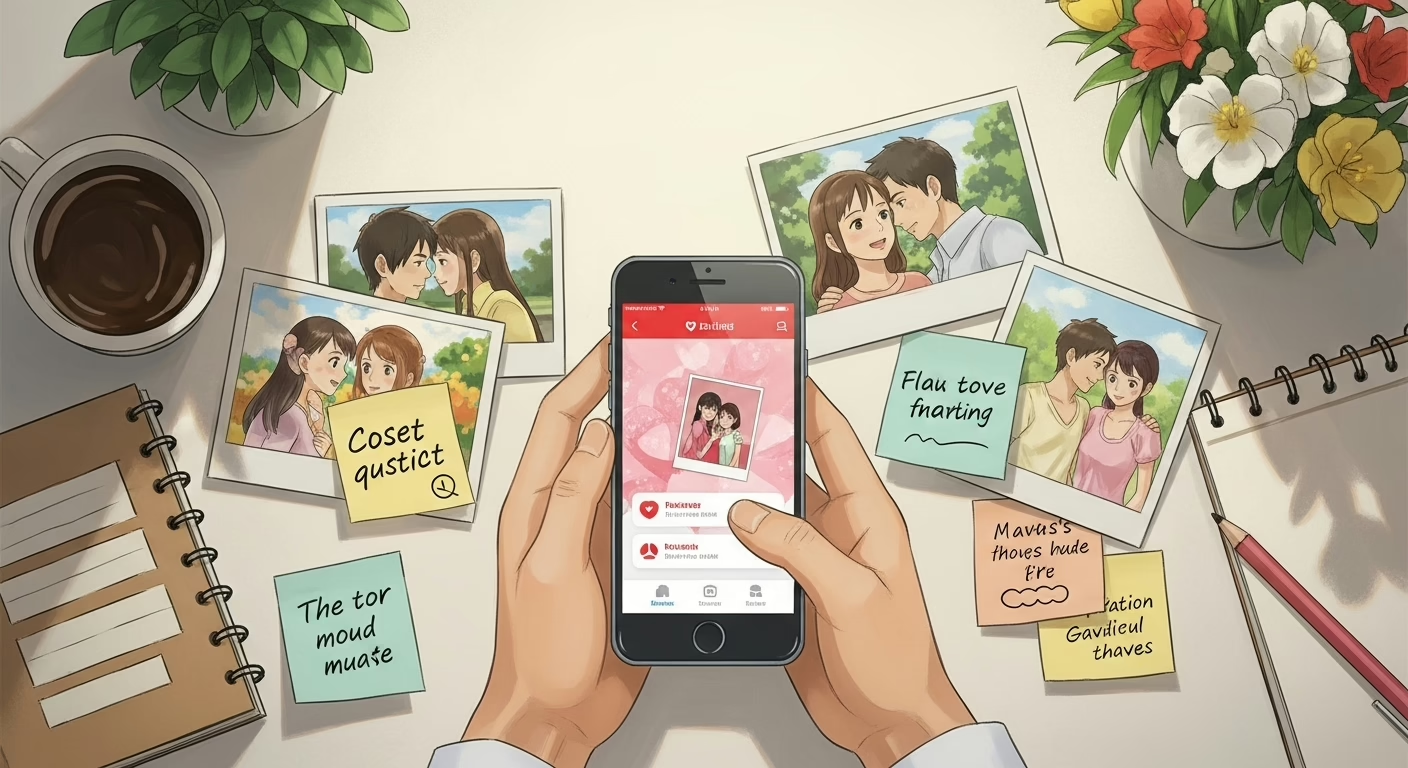Common Dating Mistakes to Avoid in Your 20s and 30s
The Dating Mistakes Everyone Makes (And How to Stop) – Dating in one’s twenties and thirties presents a complex landscape where emotional intelligence meets real-world experience, yet many individuals find themselves repeating counterproductive patterns that sabotage potential connections.
The brain’s mirror neurons, which help us read social cues and build rapport, often become overshadowed by anxiety-driven behaviors that create artificial barriers between authentic selves and meaningful partnerships.
What separates those who build lasting relationships from those who cycle through endless first dates?
TL;DR
Hide- Avoid relying on rehearsed pickup lines or scripts that trigger insincerity detection and create barriers to genuine connection.
- Don't confuse arrogance with confidence—authentic self-acceptance outperforms fake bravado in building meaningful relationships.
- Abandon outdated dating rules like waiting three days to text, which create mixed signals and prevent natural emotional flow.
- Resist rushing through the honeymoon phase without taking time to assess core character, values, and red flags.
- Stop playing games or hiding true intentions—direct communication about goals attracts compatible partners and builds trust.
The Wrong Approach to First Impressions and Opening Lines
When approaching someone new, many people sabotage their chances before they even begin speaking by relying on rehearsed lines that trigger the other person’s mirror neurons to detect insincerity, creating an immediate barrier to genuine connection.
The most effective first impressions stem from authentic confidence rather than manufactured personas, requiring a cognitive reframing that shifts focus from impressing others to creating mutually engaging conversations that reveal shared interests and values.
- How to Approach Someone You Like: Confidence Tips That Work
- The Psychology Behind Why Pickup Lines Work (Or Don’t)
- Building Confidence for Dating: A Complete Guide
- How to Be Charming: 15 Science-Backed Tips for Better Conversations
- Signs Someone Is Interested: How to Read Body Language
- How to Start a Conversation on Dating Apps: The Ultimate Guide
Mastering the art of meaningful opening exchanges involves understanding that memorable interactions emerge from curiosity-driven questions and active listening, not from clever one-liners that prioritize performance over authentic human connection.
Why Generic Pickup Lines Actually Push People Away
Research in social psychology reveals that generic pickup lines trigger immediate skepticism because our mirror neurons, which help us detect authentic social cues, recognize the rehearsed nature of these approaches and signal potential insincerity.
When someone delivers a memorized script, the recipient’s cognitive processes naturally engage in what researchers call “authenticity assessment,” a rapid evaluation that often results in defensive responses rather than genuine interest.
The encouraging truth is that authentic conversation starters, which reflect genuine curiosity about the other person and demonstrate real personality, consistently outperform clichéd lines because they activate the brain’s reward centers associated with meaningful social connection.
Making this a completely learnable skill that improves with practice.
The Science Behind Why Clichéd Lines Don’t Work
Although pickup lines have become deeply embedded in popular culture as a dating strategy, neuroscience reveals that these formulaic approaches actually trigger defensive responses in the human brain, particularly within the anterior cingulate cortex which processes social threat detection.
Cliché lines bypass authentic connection, while emotional intelligence creates genuine rapport through mirror neurons that respond to sincere communication.
How Authenticity Beats Memorized Scripts Every Time
The fundamental difference between authentic communication and rehearsed scripts lies in the brain’s remarkable ability to detect genuine versus manufactured social cues, a process that occurs within milliseconds of initial contact.
This rapid detection determines whether someone feels drawn to or repelled by another person.
Authentic conversations activate mirror neurons, creating genuine connections that memorized approaches simply cannot replicate.
Building Genuine Confidence Without Pretending to Be Someone Else
Many people fall into the trap of believing they must create an entirely different persona to attract romantic interest, when research on mirror neurons suggests that authentic self-expression actually triggers more positive responses in others than manufactured charm.
The key lies in understanding that genuine confidence stems from self-acceptance and the willingness to share one’s true interests, values, and quirks without apology, while arrogance manifests as overcompensation that often masks deep insecurity.
Recognizing the Difference Between Confidence and Arrogance
When someone enters the dating world with misplaced bravado, mistaking arrogance for genuine confidence, they inadvertently trigger a psychological response in potential partners that activates mirror neurons—specialized brain cells that help people sense authentic emotions versus manufactured personas.
This activation causes an immediate disconnect that can derail romantic possibilities before they even begin. Developing self-awareness and emotional intelligence creates authentic connections.
Simple Ways to Show Your True Personality From the Start
Authentic self-expression in dating begins with understanding that scripted pickup lines and carefully rehearsed personas create cognitive dissonance between one’s true identity and the projected image.
This dissonance leads potential partners to unconsciously detect inconsistencies through subtle behavioral cues, vocal patterns, and body language that signal insincerity.
Authentic storytelling replaces manufactured charm, while genuine personal branding emerges naturally through consistent, honest interactions.
Making Memorable First Conversations That Actually Matter
Many people sabotage potentially meaningful connections by either sticking to surface-level topics that reveal nothing about their personality, or immediately jumping into overly personal territory that triggers the other person’s psychological defense mechanisms.
The art of meaningful conversation lies in recognizing subtle verbal and nonverbal cues—such as sustained eye contact, mirroring body language, and follow-up questions—that indicate genuine interest, while gradually transitioning from light topics to more substantive discussions about values, passions, and perspectives.
When someone masters this balance between appropriate vulnerability and emotional intelligence, they create the kind of authentic rapport that activates mirror neurons in both participants, fostering the natural connection that forms the foundation of lasting relationships.
Moving Beyond Small Talk Into Meaningful Connections
Although countless dating advice articles focus on crafting the perfect pickup line or memorizing conversation starters, the real challenge lies in transforming surface-level exchanges into genuine connections that reveal authentic personality and shared values.
Emotional vulnerability, when balanced with active listening, creates cognitive reframing opportunities that activate mirror neurons and establish deeper rapport.
Once two people establish meaningful dialogue that moves beyond surface-level exchanges, the next challenge becomes accurately interpreting the subtle behavioral signals that indicate genuine romantic interest, rather than relying on misguided assumptions about what constitutes an impressive opening strategy.
Non verbal cues, including sustained eye contact and mirrored body language, reveal intuitive attraction more reliably than verbal affirmations alone.
Playing Games Instead of Being Direct About Your Intentions
Modern dating culture has created an elaborate web of artificial rules and timelines that often encourage people to hide their true intentions behind strategic games.
Yet this approach frequently backfires by creating confusion, mistrust, and missed connections with potentially compatible partners.
When individuals embrace direct communication about their dating goals, relationship expectations, and genuine interest levels, they activate their mirror neurons more effectively.
This allows both parties to read authentic social cues rather than deciphering mixed signals that trigger anxiety and uncertainty.
The pervasive chase culture that dominates contemporary dating apps and social interactions can be transformed through cognitive reframing, where honest expression of interest becomes a strength rather than a vulnerability.
Ultimately, this approach attracts people who appreciate transparency and filters out those who thrive on emotional manipulation.
The Problem with Modern Dating “Rules” and Artificial Timelines
Modern dating culture has created an intricate web of artificial rules and timelines that often prevent authentic connections from forming, with outdated advice like waiting three days to text serving as barriers rather than bridges to meaningful relationships.
When individuals follow these prescribed formulas instead of communicating their genuine intentions, they inadvertently trigger cognitive reframing in potential partners, who may interpret delayed responses or mixed signals as disinterest or emotional unavailability.
The resulting confusion damages the natural flow of relationship development, creating unnecessary obstacles that could be avoided through direct, honest communication that allows mirror neurons to facilitate genuine emotional connection between two people.
Why Waiting Three Days to Text Is Outdated Advice
Although many singles continue to follow the antiquated three-day texting rule believing it creates mystery and desirability, this approach often backfires by sending mixed signals that confuse potential partners and undermine authentic connection.
Modern relationships thrive on genuine communication rather than artificial text timing strategies, where digital patience should reflect natural conversation flow instead of manipulative game-playing tactics.
How Mixed Signals Damage Potential Relationships Before They Start
Playing games and following artificial dating timelines creates a cascade of mixed signals that actively sabotage relationship potential.
These manufactured behaviors trigger cognitive dissonance in potential partners who struggle to decode authentic intentions from strategic manipulation.
Relationship clarity emerges when individuals abandon these counterproductive tactics, choosing vulnerability over calculated moves that confuse rather than connect.
Being Clear About What You Want Without Scaring People Away
The challenge of expressing romantic intentions without overwhelming potential partners requires mastering the delicate art of honest communication that respects both personal boundaries and the natural progression of relationships.
While cognitive reframing can help individuals view directness as strength rather than vulnerability, the key lies in presenting one’s dating goals with confidence and emotional intelligence.
Allowing conversations to unfold organically rather than forcing premature declarations that might trigger defensive responses is essential.
This balanced approach enables daters to honor their authentic desires while creating space for mutual understanding to develop, ultimately fostering connections built on genuine compatibility rather than strategic maneuvering.
Communicating Your Dating Goals Honestly and Tactfully
When individuals navigate the delicate balance between transparency and timing in romantic pursuits, they often fall into the trap of either concealing their true intentions through manipulative tactics or overwhelming potential partners with premature declarations of long-term commitment.
- Practice honest communication through gradual revelation of your relationship goals during natural conversation moments.
- Express clear intentions without ultimatums by sharing your values and timeline preferences openly.
- Use cognitive reframing techniques to view vulnerability as strength rather than weakness.
- Mirror neurons activate when partners sense authentic emotional expression versus calculated responses.
Finding the Balance Between Casual and Serious Dating Intentions
Authentic self-expression in dating requires individuals to navigate the complex spectrum between casual exploration and serious commitment seeking.
Many people mistakenly believe that strategic ambiguity will keep more options open while actually creating confusion and missed connections with potentially compatible partners.
Successful daters embrace casual commitment while maintaining serious flexibility, allowing relationships to evolve naturally.
Avoiding the Chase Culture That Leads to Toxic Patterns
The modern dating landscape has unfortunately normalized chase culture, where individuals believe that creating distance, withholding communication, or deliberately appearing unavailable will somehow increase their desirability.
Yet this approach typically activates others’ mirror neurons in ways that signal disinterest rather than intrigue.
When people employ tactics like delayed responses, mixed signals, or emotional unavailability under the misguided belief that “playing hard to get” creates attraction, they often trigger cognitive reframing in potential partners who interpret these behaviors as genuine lack of interest and subsequently redirect their attention elsewhere.
Building authentic connections requires moving beyond these counterproductive games and instead focusing on genuine engagement that demonstrates consistent interest, clear communication, and emotional availability.
This creates the foundation for mutual attraction based on real compatibility rather than manufactured scarcity.
Understanding Why Playing Hard to Get Often Backfires
Although society has long romanticized the art of playing hard to get, this dating strategy frequently creates more problems than it solves, often leaving both parties confused, frustrated, and emotionally exhausted rather than building the genuine connection they originally sought.
- Distorts healthy power dynamics by creating artificial scarcity and emotional distance
- Prevents authentic emotional vulnerability from developing naturally between potential partners
- Triggers cognitive reframing where mixed signals become interpreted as disinterest or rejection
- Disrupts mirror neurons responsible for building empathy and genuine interpersonal connection
Building Mutual Interest Through Genuine Engagement
Rather than perpetuating these counterproductive patterns, individuals can foster meaningful connections by embracing direct communication and authentic interest, which creates a foundation where both people feel valued, understood, and emotionally safe to express their genuine feelings without fear of judgment or manipulation.
Genuine engagement through shared mutual interests activates mirror neurons, naturally building rapport and emotional connection.
Modern technology, while offering unprecedented opportunities to connect with potential partners, can inadvertently create barriers to authentic relationship building when individuals fall into predictable digital patterns that sabotage romantic connections.
Many well-intentioned daters find themselves trapped in cycles of over-analyzing response times and emoji choices, which triggers their mirror neurons to misinterpret neutral digital communications as signs of disinterest.
At the same time, these patterns allow dating platforms to replace rather than supplement real-world social skills development.
These technological pitfalls, combined with the curated highlight reels of social media that create unrealistic relationship benchmarks, can be effectively addressed through cognitive reframing techniques.
Such techniques help individuals recognize the difference between digital communication limitations and actual romantic compatibility indicators.
Over-Analyzing Every Digital Interaction and Response Time
The modern dating landscape has transformed simple text messages into complex psychological puzzles, where individuals find themselves scrutinizing response times, dissecting emoji choices, and creating elaborate theories about what a “read” receipt truly means about their romantic prospects.
This digital overthinking trap, fueled by our brain’s mirror neurons constantly seeking social validation cues, often creates more anxiety than actual insight into someone’s genuine interest level.
Breaking free from this exhausting cycle requires cognitive reframing techniques that help distinguish between meaningful communication patterns and the arbitrary nature of modern technology habits, allowing daters to focus on authentic connection rather than the misleading metrics of instant messaging.
Breaking Free from the Read Receipt Anxiety Cycle
When someone sees those two small words “Read” beneath their carefully crafted message, a cascade of overthinking often begins that can transform even the most confident individuals into anxious interpreters of digital silence.
- Disable read receipts to eliminate the psychological pressure that creates unnecessary emotional turbulence.
- Practice digital patience through cognitive reframing techniques that challenge catastrophic thinking patterns.
- Establish response time boundaries that honor both your needs and realistic communication expectations.
- Focus on offline activities to prevent read receipt anxiety from dominating your mental space.
Why Immediate Responses Don’t Always Mean More Interest
Rapid-fire text exchanges create a deceptive illusion that swift responses directly correlate with romantic interest. Yet this assumption overlooks the complex web of factors that influence how people manage their digital communication patterns throughout their daily lives.
Response speed varies dramatically based on work schedules, social obligations, and personal communication preferences, making it an unreliable metric for measuring genuine interest signals.
Using Dating Apps as a Crutch Instead of a Tool
When individuals rely exclusively on dating applications rather than treating them as one component of a thorough social strategy, they often find themselves trapped in an endless cycle of swiping that replaces genuine human connection with the illusion of romantic progress.
The key to successful modern dating lies in creating authentic profiles that accurately reflect one’s true personality, values, and interests, while simultaneously maintaining an active presence in real-world social environments where mirror neurons can facilitate the natural chemistry that screens simply cannot replicate.
Creating Profiles That Represent Your Real Self
The foundation of meaningful digital connections rests entirely on authenticity, yet countless individuals sabotage their romantic prospects by crafting dating profiles that function as fictional narratives rather than honest self-representations.
Genuine presentation allows your authentic self to attract compatible partners who appreciate your real qualities.
- Select photos that showcase natural expressions and diverse activities
- Write bio descriptions using conversational language that reflects your actual personality
- Include genuine interests rather than what you think others want to hear
- Acknowledge both strengths and growth areas to demonstrate emotional maturity
Balancing Online Dating with Meeting People in Real Life
Although modern dating apps provide unprecedented access to potential partners, many individuals fall into the trap of using these digital platforms as emotional crutches rather than supplementary tools.
This inadvertently creates a cycle of dependency that stunts their ability to form genuine connections in organic, face-to-face environments.
Establishing healthy digital boundaries while prioritizing offline intimacy cultivates authentic relationship skills.
Social media platforms present carefully curated highlight reels that trigger our mirror neurons to unconsciously compare our behind-the-scenes reality with others’ polished performances.
This creates unrealistic benchmarks for romantic success that can undermine perfectly healthy relationships.
The constant exposure to idealized couple photos, elaborate gestures, and milestone announcements often leads individuals to question whether their own partnerships measure up.
In reality, these digital snapshots represent mere moments rather than the complete relationship experience.
Cognitive reframing becomes essential when individuals recognize that authentic intimacy flourishes in private spaces away from public validation.
Allowing couples to build genuine connection without the pressure of performing for an online audience.
Avoiding the Comparison Trap with Other Couples Online
When individuals scroll through carefully curated social media feeds showcasing other couples’ highlight reels, they unknowingly activate their mirror neurons—specialized brain cells that cause people to experience emotions as if they were living someone else’s experiences.
This activation can trigger destructive comparison patterns that undermine their own relationship satisfaction.
- Establish social media boundaries by limiting exposure to triggering content
- Practice cognitive reframing when online jealousy surfaces unexpectedly
- Focus on authentic moments rather than performative relationship displays
- Celebrate unique relationship milestones without external validation needs
Keeping Private Moments Private in the Age of Oversharing
Beyond the pitfalls of comparison lies another equally damaging phenomenon where couples feel compelled to document and share every romantic gesture, intimate conversation, and vulnerable moment with their online audiences.
Effectively transforming their private relationship into a public performance that prioritizes external validation over genuine connection.
Establishing digital boundaries and privacy priorities creates sacred space for authentic intimacy.
Rushing Into Relationships Without Building a Foundation
In the intoxicating early stages of romance, many individuals find themselves confusing the intense neurochemical rush of infatuation with genuine long-term compatibility, a cognitive error that occurs when mirror neurons create an overwhelming sense of connection before partners have truly assessed their fundamental values and life trajectories.
This accelerated emotional timeline often leads couples to bypass vital conversations about future goals, financial philosophies, and relationship expectations, while simultaneously rushing into physical or emotional intimacy that outpaces the natural development of trust and mutual understanding.
The foundation-building phase, though less thrilling than the initial spark, serves as the bedrock for sustainable relationships, requiring partners to engage in deliberate discussions about their individual needs, boundaries, and long-term visions before committing to a shared future.
Mistaking Infatuation for Long-Term Compatibility
The intoxicating rush of early attraction often triggers a neurochemical cascade that can cloud judgment, making it challenging to distinguish between temporary infatuation and the deeper compatibility markers that sustain long-term relationships.
During this honeymoon phase, when mirror neurons fire intensely and create feelings of profound connection, individuals may overlook significant red flags or rush past the essential process of truly understanding their partner’s core values, communication patterns, and character traits.
Learning to recognize these warning signs while intentionally slowing down the relationship timeline allows couples to build a solid foundation based on genuine compatibility rather than the fleeting euphoria of new romance.
Learning to Identify Red Flags During the Honeymoon Phase
How can someone distinguish between the intoxicating rush of new romance and genuine compatibility when powerful neurochemicals flood the brain, creating what researchers call the “honeymoon phase” of dating?
Red flag recognition requires intentional awareness during this euphoric period, while honeymoon honesty demands acknowledging concerning behaviors despite overwhelming attraction.
- Notice inconsistencies between words and actions
- Observe how they treat service workers
- Assess their reaction to boundaries
- Monitor communication patterns during stress
Taking Time to Actually Get to Know Someone’s Character
Beyond identifying warning signs during those chemistry-fueled early weeks, many daters struggle with an equally challenging task: creating adequate space and time to genuinely understand their partner’s core character traits, values, and relationship patterns before making significant emotional or physical commitments.
Genuine curiosity about their responses to stress, coupled with authentic listening during deeper conversations, reveals true compatibility.
Moving Too Fast Physically or Emotionally
When individuals rush into physical intimacy or emotional vulnerability without establishing clear personal boundaries, they often find themselves in situations that feel uncomfortable, overwhelming, or misaligned with their values. This can undermine the natural progression of a meaningful relationship.
The practice of understanding one’s own limits around physical contact, emotional sharing, and relationship milestones, then communicating these boundaries with clarity and confidence, creates a framework that allows both people to feel secure while exploring their connection at a sustainable pace.
Research suggests that couples who take time to build emotional intimacy gradually, rather than accelerating through relationship stages, often develop stronger neural pathways associated with trust and attachment. Demonstrating how patience in early dating can lead to more resilient long-term partnerships.
Understanding Your Own Boundaries and Communicating Them
The foundation of any healthy relationship rests upon each person’s ability to recognize their own emotional and physical boundaries, communicate them clearly to their partner, and respect the boundaries that others establish in return.
- Practice self awareness exercises through journaling to identify personal comfort zones.
- Implement boundary setting techniques using “I” statements during conversations.
- Schedule regular check-ins to reassess boundaries as relationships evolve naturally.
- Recognize that cognitive reframing helps reframe boundary discussions as relationship-strengthening opportunities.
Why Slowing Down Often Leads to Stronger Connections
Learning to communicate personal limits effectively creates the perfect foundation for addressing one of the most common relationship pitfalls: moving too quickly through emotional and physical milestones before establishing genuine compatibility and trust.
When individuals embrace patience rewards through deliberate pacing, they discover that emotional depth naturally develops through shared experiences, meaningful conversations, and gradual vulnerability that strengthens authentic connections.
Ignoring Important Conversations About Future Goals
Many individuals find themselves emotionally invested in relationships before discovering fundamental incompatibilities regarding career aspirations, family planning, or lifestyle preferences, which creates unnecessary heartbreak that could be prevented through early, honest communication.
The practice of discussing major life goals within the first few meaningful conversations allows both parties to assess compatibility while emotional attachment remains manageable, enabling clearer decision-making without the cognitive bias that intense feelings often create.
Recognizing when someone desires a completely different future requires the courage to acknowledge these differences early, rather than hoping that time or deeper connection will somehow bridge gaps between incompatible visions of life.
Discussing Life Plans Before Getting Too Attached
One essential conversation that often gets postponed until emotions have already deepened involves discussing fundamental life goals, career aspirations, family planning, and geographic preferences, which can prevent significant heartache when incompatibilities surface later in the relationship.
- Assess emotional readiness before diving into serious relationship discussions
- Share career trajectories and professional ambitions openly
- Explore family planning perspectives including children and timeline expectations
- Discuss geographic flexibility for potential relocations
Recognizing When Someone Wants Different Things Than You Do
When individuals rush into romantic connections without establishing clear communication patterns about fundamental values and future aspirations, they often find themselves emotionally invested in someone whose life trajectory diverges markedly from their own.
This creates a painful cognitive dissonance that requires honest self-reflection and the difficult process of cognitive reframing to accept incompatibility.
Unaligned expectations and mixed signals frequently emerge when partners avoid discussing core relationship goals, leaving both individuals wondering whether their emotional investment aligns with realistic long-term possibilities for mutual fulfillment.
Losing Yourself in the Process of Dating and Relationships
One of the most counterproductive patterns in dating involves gradually abandoning the very qualities, relationships, and interests that make someone uniquely attractive, as individuals unconsciously engage in cognitive reframing that prioritizes their romantic connection above all other aspects of their identity.
This self-erasure often manifests through distancing oneself from longtime friendships and cherished hobbies, adopting personality traits that mirror neurons suggest will appeal to their partner, and developing an unhealthy dependence on romantic validation rather than cultivating intrinsic self-worth.
While the desire to connect deeply with someone special is natural and beautiful, maintaining one’s authentic core becomes essential for creating sustainable relationships that honor both partners’ individual growth and shared partnership goals.
Abandoning Your Friends and Hobbies for a New Relationship
One of the most counterproductive patterns that emerges during the early stages of romantic relationships involves the gradual abandonment of established friendships and personal interests.
This phenomenon often stems from the misconception that complete devotion to a partner demonstrates greater commitment.
This cognitive reframing error fails to recognize that maintaining one’s social circle and independent pursuits actually strengthens relationship dynamics, as it prevents the unhealthy codependency that can suffocate romantic connections and diminish individual identity.
Research suggests that individuals who preserve their personal interests and friendships while dating activate mirror neurons in their partners that respond positively to confidence and autonomy, making them more attractive rather than less devoted.
Although the intoxicating rush of new romance can create a powerful gravitational pull that seems to eclipse all other relationships and interests, maintaining one’s established social circle and personal pursuits represents a critical component of healthy relationship development that many individuals inadvertently compromise during the honeymoon phase.
- Establish clear friendship boundaries early by communicating your commitment to existing relationships.
- Create intentional social overlap by gradually introducing your partner to different friend groups.
- Schedule regular friend-only activities to preserve intimate bonds independent of romantic involvement.
- Practice cognitive reframing when guilt arises about time spent away from your partner.
Why Independent Interests Make You More Attractive
The paradox of romantic attraction reveals that individuals who maintain their distinct identities, passionate pursuits, and personal growth trajectories consistently demonstrate higher levels of sustained appeal than those who sacrifice their authentic selves at the altar of relationship conformity.
Independent passions create fascinating conversations, while ongoing self growth ensures partners discover new qualities continuously, preventing relationship stagnation.
Changing Your Personality to Match What You Think Someone Wants
One of the most counterproductive patterns that emerges in modern dating involves the tendency to reshape one’s authentic personality, values, and interests to align with what someone perceives their potential partner desires.
This process ultimately undermines the foundation for genuine connection.
This adaptive behavior, while stemming from a natural desire to be accepted, creates an unsustainable dynamic where individuals must continuously maintain a facade that contradicts their core identity, leading to emotional exhaustion and relationship instability.
The paradox becomes clear when considering that lasting partnerships require mutual appreciation of authentic traits, meaning that the right person will naturally gravitate toward one’s genuine self rather than a carefully constructed persona designed to meet imagined expectations.
Staying True to Your Values While Being Open to Growth
When individuals find themselves caught in the delicate balance between authenticity and adaptation, they often face the challenging paradox of wanting to grow while simultaneously maintaining their core identity.
This is particularly true as mirror neurons naturally cause people to unconsciously mimic behaviors and attitudes of those they’re attracted to.
- Practice cognitive reframing to distinguish between compromising your authentic self versus healthy personal growth through relationship experiences.
- Establish non-negotiable values before dating to create clear boundaries that protect your fundamental beliefs and character traits.
- Communicate openly about your core principles early in relationships to ensure compatibility without sacrificing your genuine identity.
- Embrace selective adaptation by choosing which new perspectives enhance rather than replace your existing authentic self.
Understanding That the Right Person Will Like You as You Are
Although the pressure to become someone else’s ideal partner can feel overwhelming, many individuals unknowingly sacrifice their authentic selves by adopting personas they believe will make them more attractive.
Yet this transformative approach often backfires because genuine compatibility requires two people to appreciate each other’s true nature rather than carefully constructed facades.
Self love and personal authenticity create lasting connections.
Seeking Validation Through Dating Instead of Building Self-Worth
Many individuals unconsciously turn to dating as a source of external validation, seeking confirmation of their worth through romantic attention rather than cultivating an internal foundation of self-respect and confidence.
This pattern, which cognitive behavioral therapists recognize as externalized self-worth, often leads to anxiety-driven dating behaviors where one’s emotional stability becomes dependent on another person’s responses, creating an unstable foundation for genuine connection.
The most successful daters typically spend time developing their own interests, values, and emotional regulation skills before entering relationships, understanding that a strong sense of individual identity actually enhances their ability to form healthy partnerships rather than diminishing their attractiveness to potential mates.
Developing a Strong Sense of Self Before Seeking Partnership
One of the most significant yet overlooked foundations for successful dating involves cultivating a complete and authentic sense of self before actively pursuing romantic partnerships.
Individuals who lack this internal compass often find themselves unconsciously morphing into versions of themselves they believe will be more attractive to potential partners.
- Practice self awareness through daily reflection to understand your core values, emotional patterns, and relationship needs.
- Engage in personal growth activities like therapy, journaling, or mindfulness meditation to strengthen your emotional foundation.
- Develop independent interests and friendships that exist separately from romantic pursuits to maintain your unique identity.
- Challenge yourself professionally and creatively to build confidence that stems from personal accomplishment rather than external validation.
Learning to Be Happy Single Before Committing to Someone
When individuals consistently seek romantic partnerships to fill emotional voids or validate their self-worth, they inadvertently create a dependency cycle that undermines both their personal happiness and their ability to form healthy relationships.
This external validation-seeking behavior often leads to compromising core values, ignoring red flags, and settling for incompatible partners simply to avoid being alone.
Cultivating self love and emotional resilience transforms dating from desperate searching into confident choosing.
Learning from Past Relationships Instead of Repeating Patterns
Many individuals unknowingly repeat destructive relationship patterns because they carry unresolved emotional baggage from previous partnerships, failing to engage in meaningful self-reflection that could illuminate why certain dynamics consistently emerge in their romantic lives.
The tendency to quickly rebound into new relationships, while emotionally understandable as a way to avoid processing painful experiences, often prevents people from identifying their own behavioral patterns, attachment styles, and the unconscious criteria they use when selecting partners.
Instead of viewing breakups as failures to escape from rapidly, individuals who approach these transitions as opportunities for cognitive reframing—consciously restructuring their thoughts about what happened and why—can transform painful endings into valuable learning experiences that inform healthier future choices.
Carrying Baggage from Previous Relationships Into New Ones
One of the most pervasive patterns in modern dating involves individuals unconsciously transferring unresolved emotions, expectations, and defensive mechanisms from previous relationships onto new partners, creating a cycle where past wounds dictate present behaviors rather than allowing fresh connections to develop organically.
The journey toward healthier relationship dynamics requires honest self-reflection to identify when projection occurs, which happens when someone attributes their former partner’s negative traits or behaviors to a current romantic interest without substantial evidence.
This process is often triggered by mirror neurons that activate familiar emotional responses based on superficial similarities.
Processing past hurt through techniques like cognitive reframing, where individuals consciously challenge automatic negative thoughts and replace them with balanced perspectives, creates the emotional space necessary to approach new relationships with curiosity rather than predetermined conclusions about how things will unfold.
Processing Past Hurt Before Opening Your Heart Again
Although the heart’s capacity for love remains infinite, unresolved emotional wounds from previous relationships can create invisible barriers that prevent individuals from forming healthy connections with new partners.
- Practice cognitive reframing to transform past trauma into learning experiences rather than defining limitations.
- Engage mirror neurons through self-compassion exercises that rewire emotional responses to intimacy.
- Establish clear boundaries between previous hurt and current relationship potential.
- Seek professional guidance when emotional healing requires structured support.
Recognizing When You’re Projecting Past Experiences
When emotional echoes from previous relationships begin influencing perceptions of new romantic partners, individuals often find themselves trapped in unconscious cycles of projection that distort present-day interactions through the lens of past disappointments.
Cognitive reframing techniques help distinguish between legitimate concerns and emotional baggage, while mindful awareness prevents past trauma from contaminating fresh connections.
Not Taking Time to Reflect on What Went Wrong
Many individuals rush from one relationship to the next without pausing to examine their own contributions to relationship breakdowns.
Missing essential opportunities for personal growth can prevent them from transforming their romantic future.
Through honest self-assessment and pattern recognition, people can identify recurring behaviors, communication styles, and relationship choices that consistently lead to disappointment.
This awareness allows them to break free from destructive cycles that keep them emotionally stuck.
This reflective process, while initially uncomfortable, serves as the foundation for developing healthier relationship skills. It also helps in making more conscious partner selections based on genuine compatibility rather than familiar dysfunction.
Honest Self-Assessment of Your Role in Failed Relationships
While it may feel uncomfortable to examine one’s own contributions to relationship failures, this process of honest self-reflection represents one of the most powerful tools for breaking destructive dating patterns and creating healthier connections in the future.
- Practice cognitive reframing to view past relationships as learning laboratories rather than personal failures, allowing self awareness to flourish.
- Document recurring themes in relationship endings without defensiveness or blame-shifting.
- Accept accountability for communication breakdowns, boundary violations, or emotional unavailability patterns.
- Identify specific behavioral triggers that activate mirror neurons and create negative relationship dynamics.
Identifying Patterns That Keep You Stuck in the Same Cycles
Self-awareness without pattern recognition creates a frustrating cycle where individuals repeatedly find themselves experiencing the same relationship disappointments, despite having identified their personal contributions to past romantic failures.
Effective patterns analysis requires examining relationships collectively rather than individually, while developing cycle awareness helps identify recurring themes in partner selection, communication styles, and relationship trajectories that unconsciously sabotage romantic success.
Growing from Breakups Instead of Just Moving On Quickly
Rather than rushing into the next relationship as a distraction from emotional pain, individuals who treat breakups as valuable learning laboratories often discover that each dating experience contains essential data for personal growth, particularly when they consciously practice new communication techniques and apply cognitive reframing to transform disappointment into insight.
The process of reflecting on relationship patterns, identifying specific areas for improvement, and deliberately experimenting with different approaches to conflict resolution or emotional expression creates a foundation for more authentic connections.
As mirror neurons help individuals internalize healthier relationship behaviors through mindful practice, this reflection becomes a powerful tool for growth.
When people embrace this reflective approach, they gradually build a toolkit of refined interpersonal skills, emotional resilience, and self-awareness.
This transformation turns future relationships from repetitive cycles into progressively more fulfilling partnerships.
Using Dating Experiences as Opportunities for Personal Development
Although many individuals instinctively rush to fill the emotional void left by a failed relationship, those who invest time in genuine self-reflection often discover that their romantic disappointments contain valuable insights about personal patterns, unmet needs, and areas for growth.
- Practice cognitive reframing to transform relationship setbacks into self-awareness growth opportunities.
- Develop emotional intelligence through mindful analysis of communication breakdowns.
- Identify recurring patterns in partner selection and relationship dynamics.
- Create intentional growth plans based on discovered insights.
Building Better Communication Skills Through Practice and Reflection
Why do countless individuals find themselves trapped in recurring cycles of communication breakdown, repeatedly experiencing the same frustrating patterns across multiple relationships without recognizing the common denominator?
Through deliberate practice of emotional intelligence and active listening, coupled with honest reflection after each interaction, people can develop stronger communication skills that transform their dating experiences into meaningful connections.
Final Thoughts
While statistics reveal that 73% of singles report feeling more confident in dating after learning from past mistakes, these formative decades offer invaluable opportunities for cognitive reframing around relationship patterns.
Those who embrace authentic communication, establish clear boundaries, and resist social media comparisons often discover that meaningful connections emerge naturally through genuine self-expression.
Dating challenges become stepping stones toward emotional maturity when individuals prioritize self-awareness over perfection.









